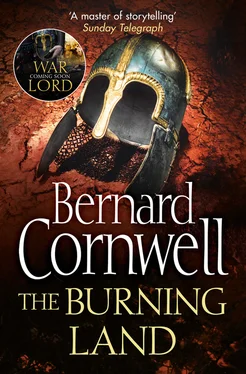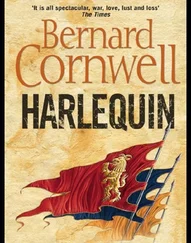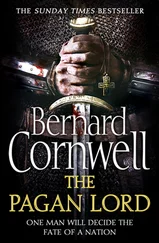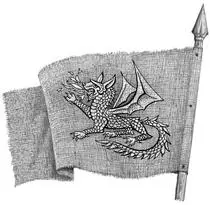

HarperCollins Publishers
1 London Bridge Street
London SE1 9GF
www.harpercollins.co.uk
First published in Great Britain by HarperCollins Publishers 2009
Copyright © Bernard Cornwell 2009
Map © John Gilkes 2009
Family Tree © Colin Hall 2009
Cover layout design © HarperCollins Publishers Ltd 2016
Cover illustration © Larry Rostant
Bernard Cornwell asserts the moral right to be identified as the author of this work.
A catalogue record for this book is available from the British Library.
This novel is entirely a work of fiction. The names, characters and incidents portrayed in it, while at times based on historical figures, are the work of the author’s imagination.
All rights reserved under International and Pan-American Copyright Conventions. By payment of the required fees, you have been granted the non-exclusive, non-transferable right to access and read the text of this e-book on-screen. No part of this text may be reproduced, transmitted, down-loaded, decompiled, reverse engineered, or stored in or introduced into any information storage and retrieval system, in any form or by any means, whether electronic or mechanical, now known or hereinafter invented, without the express written permission of HarperCollins.
Source ISBN: 9780007219766
Ebook Edition © October 2009 ISBN: 9780007290017
Version: 2019-09-27
THE BURNING LAND
is for
Alan and Jan Rust
CONTENTS
Cover
Title Page
Copyright
Dedication
Place-names
Map
Family Tree
Part One: THE WARLORD
Chapter One
Chapter Two
Chapter Three
Chapter Four
Part Two: VIKING
Chapter Five
Chapter Six
Chapter Seven
Chapter Eight
Part Three: BATTLE’S EDGE
Chapter Nine
Chapter Ten
Chapter Eleven
Chapter Twelve
Chapter Thirteen
Chapter Fourteen
Historical Note
Keep Reading …
About the Author
Also by Bernard Cornwell
About the Publisher
The spelling of place names in Anglo Saxon England was an uncertain business, with no consistency and no agreement even about the name itself. Thus London was variously rendered as Lundonia, Lundenberg, Lundenne, Lundene, Lundenwic, Lundenceaster and Lundres. Doubtless some readers will prefer other versions of the names listed below, but I have usually employed whichever spelling is cited in either the Oxford Dictionary of English Place-Names or the newer Cambridge Dictionary of English Place-Names for the years nearest or contained within Alfred’s reign, AD 871–899, but even that solution is not foolproof. Hayling Island, in 956, was written as both Heilincigae and Hæglingaiggæ. Nor have I been consistent myself; I have preferred the modern form Northumbria to Nor hymbralond to avoid the suggestion that the boundaries of the ancient kingdom coincide with those of the modern county. So this list, like the spellings themselves, is capricious.
| Æsc’s Hill |
Ashdown, Berkshire |
| Æscengum |
Eashing, Surrey |
| Æthelingæg |
Athelney, Somerset |
| Beamfleot |
Benfleet, Essex |
| Bebbanburg |
Bamburgh Castle, Northumberland |
| Caninga |
Canvey Island, Essex |
| Cent |
Kent |
| Defnascir |
Devonshire |
| Dumnoc |
Dunwich, Suffolk (now mostly vanished beneath the sea) |
| Dunholm |
Durham, County Durham |
| East Sexe |
Essex |
| Eoferwic |
York |
| Ethandun |
Edington, Wiltshire |
| Exanceaster |
Exeter, Devon |
| Farnea Islands |
Farne Islands, Northumberland |
| Fearnhamme |
Farnham, Surrey |
| Fughelness |
Foulness Island, Essex |
| Grantaceaster |
Cambridge, Cambridgeshire |
| Gleawecestre |
Gloucester, Gloucestershire |
| Godelmingum |
Godalming, Surrey |
| Hæthlegh |
Hadleigh, Essex |
| Haithabu |
Hedeby, southern Denmark |
| Hocheleia |
Hockley, Essex |
| Hothlege |
Hadleigh Ray, Essex |
| Humbre |
River Humber |
| Hwealf |
River Crouch, Essex |
| Lecelad |
Lechlade, Gloucestershire |
| Liccelfeld |
Lichfield, Staffordshire |
| Lindisfarena |
Lindisfarne (Holy Island), Northumberland |
| Lundene |
London |
| Sæfern |
River Severn |
| Scaepege |
Isle of Sheppey, Kent |
| Silcestre |
Silchester, Hampshire |
| Sumorsæte |
Somerset |
| Suthriganaweorc |
Southwark, Greater London |
| Temes |
River Thames |
| Thunresleam |
Thundersley, Essex |
| Tinan |
River Tyne |
| Torneie |
Thorney Island, an island that has disappeared – it lay close to the West Drayton station near Heathrow Airport |
| Tuede |
River Tweed |
| Uisc |
River Exe, Devonshire |
| Wiltunscir |
Wiltshire |
| Wintanceaster |
Winchester, Hampshire |
| Yppe |
Epping, Essex |
| Zegge |
Fictional Frisian island |
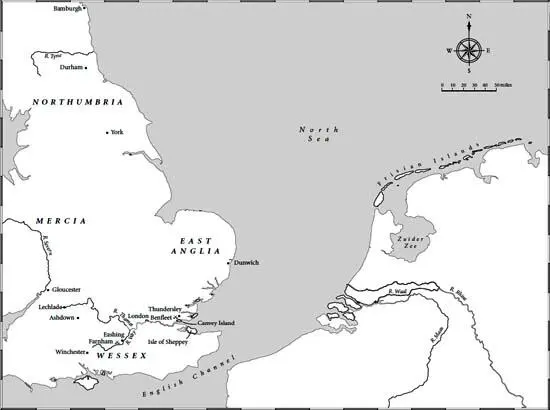
The Royal Family of Wessex
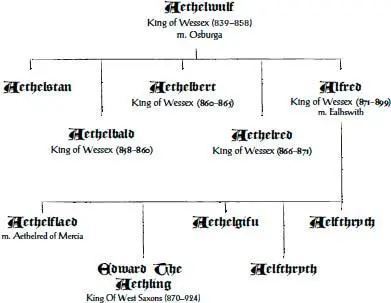

Not long ago I was in some monastery. I forget where except that it was in the lands that were once Mercia. I was travelling home with a dozen men, it was a wet winter’s day, and all we needed was shelter, food and warmth, but the monks behaved as though a band of Norsemen had arrived at their gate. Uhtred of Bebbanburg was within their walls and such is my reputation that they expected me to start slaughtering them. ‘I just want bread,’ I finally made them understand, ‘cheese if you have it, and some ale.’ I threw money on the hall floor. ‘Bread, cheese, ale, and a warm bed. Nothing more!’
Next morning it was raining like the world was ending and so I waited until the wind and weather had done their worst. I roamed the monastery and eventually found myself in a dank corridor where three miserable-looking monks were copying manuscripts. An older monk, white-haired, sour-faced and resentful, supervised them. He wore a fur stole over his habit, and had a leather quirt with which he doubtless encouraged the industry of the three copyists. ‘They should not be disturbed, lord,’ he dared to chide me. He sat on a stool beside a brazier, the warmth of which did not reach the three scribblers.
Читать дальше
